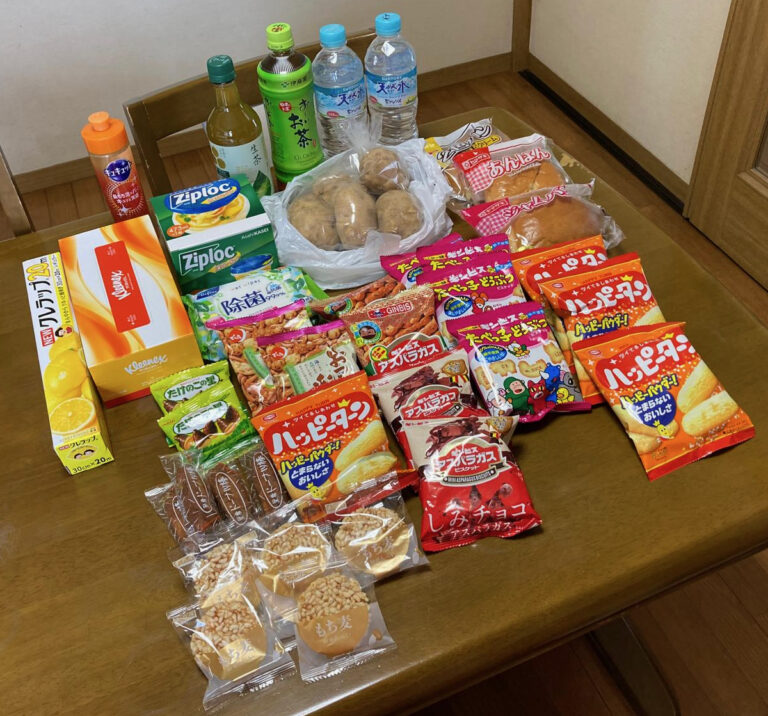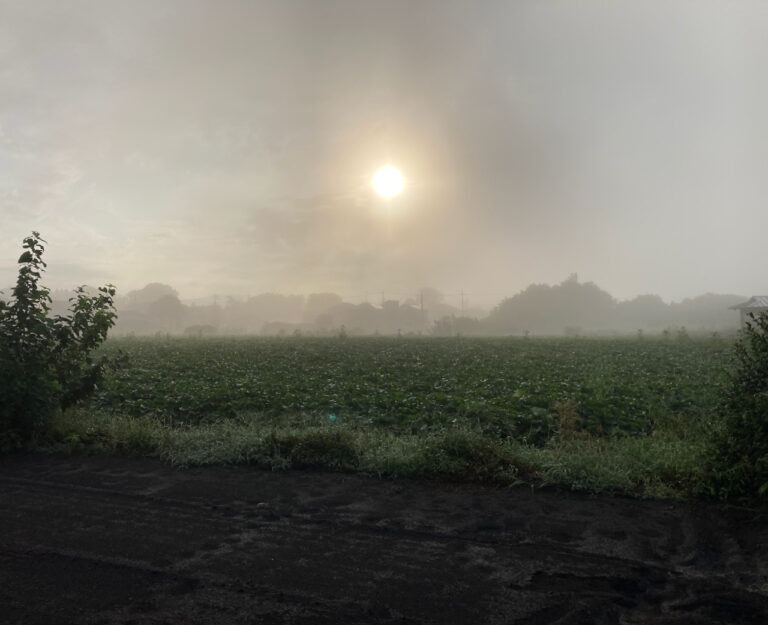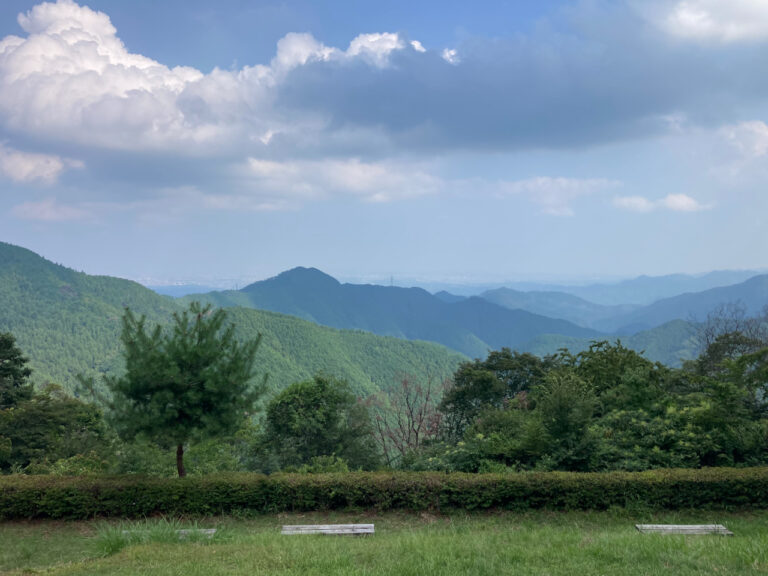‘If you don’t mind me asking,’ I said, ‘how old are you now?’
’67,’ he replied, ‘although I look about 57.’
Once Mrs M had arrived back from the cake shop, the five of us went for a day out in Hirakata, where Otoh-san’s brother Yoshihiro lives with his family.
Hirakata lies just before the border with Fukushima Prefecture, so we wanted to do some disaster sightseeing on the way, and came off the Joban Expressway at Kita-Ibaraki to join the coast road. The journey – which took us through a series of tunnels in the mountains above Hitachi – would normally have cost about a thousand yen, but as a way of boosting the economy and encouraging tourists back to Tohoku, the government has made expressway travel free of charge for pretty much anyone who lives north of Tokyo, a special offer that runs until August next year.
After parking at a convenience store, we wandered over the road to the hotel where Yoshihiro oji-san and Hisako oba-san got married about thirty years ago. Okah-san reached into the cool bag she had brought with her and handed us each a slice of Swiss roll – Otoh-san’s birthday cake – which we ate as we looked out at Futatsushima (二ツ島 / Two Islands). The name is a little misleading, as Futatsushima is more like one rocky outcrop, although Otoh-san insisted that a second, smaller ‘island’ had been washed away in the tsunami. A little further north at Ohtsu Bay there was nothing that you might call devastation – no boats stranded on the quayside and no wasteland where there used to be a town – but probably a quarter of the houses at sea level had been stripped back to their foundations, and just around the corner, a famous old building called Rokkaku-doh (六角堂 / literally ‘hexagon hall’) had been washed into the sea.
While the grounds of Rokkaku-doh (which I’ll post about in more detail another time – it was built by a Meiji Era renaissance man called Tenshin Okakura) have been closed indefinitely, there is a pathway to one side that leads down some slippery concrete steps to the water’s edge. From there you can just about see the headland where the Rokkaku-doh used to stand, and both Onii-san and I were soaked by incoming waves as we tried to get a look.
In Hirakata, Hisako oba-san runs the family restaurant – called Mori-moa – which is on the second floor of a small, burgundy-coloured building on the harbour front, and when Otoh-san tried to drive into the first-floor parking bay, there was a loud scraping noise from beneath the car.
‘Ah, I should have realised!’ he said. ‘The car’s heavier because there are five of us.’
‘The road’s probably lower than than it used to be as well,’ said Onii-san.
As Hisako explained when we went upstairs, during the earthquake the whole town had sunk about 40 centimetres into the Pacific, although an old photograph on the wall showed how much Hirakata had already changed before 11th March: a large part of the harbour had been reclaimed to create a car park and provide better mooring for fishing boats, and a long concrete wharf had been constructed at the mouth of the bay – something that almost certainly saved the town from more serious damage.
‘The tsunami came through there,’ said Hisako, pointing to a road that led into the next bay between a row of houses and a rocky outcrop not dissimilar to Futatsushima.
‘Did it break the windows downstairs?’ I asked.
‘The putty around the frames split and the window panes came loose, but thankfully they didn’t break.’
‘It must have been terrifying,’ said Okah-san.
‘I don’t know, actually. We had already evacuated to the elementary school when the tsunami hit. When we came back later in the day there was water gushing from the broken pipes – the meter was whirring around at a rate of knots.’
‘They didn’t charge you, did they?’
‘Yes, they did! Even though we blocked off the pipes the same day, the bill was really expensive. We stayed in the gym at the elementary school for twenty-five days, I think. There were some temporary baths, but people were coming from miles around to use them, so we were only allowed twenty minutes at a time, once every three days.’
This video shows what Hirakata looked like in the aftermath: Mori-moa is visible on the right as the camera pans round in the first few seconds, and the people interviewed about halfway through describe how the tsunami was almost seven metres high.
(NB. If you click on this link you may have to sit through a commercial before the video itself starts.)
‘I should think the tourist boats go out pretty early, don’t they?’ said Otoh-san.
‘The men who work on them get up at 2am,’ said Hisako. ‘They come down to the harbour to prepare and set off at five, then they’re back at about two in the afternoon.’
‘I don’t think they caught much today,’ said Onii-san. ‘Those cool boxes don’t look very heavy at all.’
Despite Hisako saying the food was on the house and Mrs M saying it was our birthday treat, Otoh-san insisted on paying the bill himself, and as he did so I peeked into the kitchen to thank the chef, realising as I did so that she was in fact Hisako’s mother, who is getting on for eighty years old.
‘These are aji (鯵 / horse mackerel),’ he said, as a flurry of ash floated down from the cigarette balanced on his bottom lip. ‘These are hoh-boh (gurnard). There are some prawns, some flat fish and some mé-hikari (literally ‘shining eyes’, and like a slightly larger variety of whitebait) – those are both really good deep fried.’
He handed me a tuna so that I could pose for a photograph, and asked if we wanted to take that with us as well, although Okah-san politely declined, saying there wouldn’t be enough room in the freezer.
‘During the earthquake,’ said Yoshihiro, ‘you could barely stand up straight, and there was this huge crashing sound when part of the cliff behind the market collapsed. The tunnel through the headland has a big crack above it now, so that’ll come down before long, I should think.‘
The headland on this side of the harbour was probably half as long as in the old photograph, although the market building itself – which had been torn down and rebuilt in a different position a few years before – was comparatively undamaged.
‘How long was the market closed after the tsunami?’ I asked Yoshihiro’s son (Otoh-san and Okah-san have so many nephews that when I asked them later, they couldn’t remember his name).
‘Not very long,’ he said. ‘Only about a month.’
‘And I suppose you have to use a Geiger counter now.‘
‘Of course. Since last month the readings have been quite high off the coast of Ibaraki, so the boats are going further south towards Chiba.‘
(Even this close to Fukushima Dai-ichi, to all intents and purposes the threat from radiation has passed, but Yoshihiro and Hisako don’t want to take any chances, so they haven’t had a visit from their grandchildren – who live on the other side of Tokyo – since the earthquake.)
‘I didn’t realise your dad was 67,’ I said to Mrs M when we arrived back at our apartment later in the evening.
’67?’ she said.
‘Yes – well, that’s what he told me.’
‘But he was 40 when I was born, so today was his 68th.’
Which means that in actual fact, Otoh-san looks about 58, which isn’t bad going for a 67 year old.




Since you just traveled near Fukushima, I thought this might interest ou. I just published Japan’s Tipping Point: Crucial Choices in the Post-Fukushima World as a short ebook and hope you will take a look at it. A paperback will be available soon. For info, see http://www.markpendergrast.com. I could email you a review copy. Here’s an overview:
Japan’s Tipping Point is a small book on a huge topic. In the post-Fukushima era, Japan is the “canary in the coal mine” for the rest of the world. Can Japan radically shift its energy policy, become greener, more self-sufficient, and avoid catastrophic impacts on the climate? Mark Pendergrast arrived in Japan exactly two months after the Fukushima meltdown. This book is his eye-opening account of his trip and his alarming conclusions.
Japan is at a crucial tipping point. A developed country that must import all of its fossil fuel, it can no longer rely on nuclear power, following the massive earthquake/tsunami/nuclear disaster of March 11, 2011. Critically acclaimed nonfiction writer Mark Pendergrast went to Japan to investigate Japan’s renewable energy, Eco-Model Cities, food policy, recycling, and energy conservation, expecting to find innovative, cutting edge programs.
He discovered that he had been naive. The Japanese boast of their eco-services for eco-products in eco-cities. Yet they rely primarily on imported fossil fuel and nuclear power, live in energy-wasteful homes, and import 60% of their food. That may be changing in the wake of the Fukushima nuclear disaster. Maybe. But as Pendergrast documents, Japan lags far behind Europe, the United States, and even (in some respects) China in terms of renewable energy efforts. And Japan is mired in bureaucracy, political in-fighting, indecision, puffery, public apathy, and cultural attitudes that make rapid change difficult.
Yet Japan is also one of the most beautiful countries in the world, with friendly, resilient people who can, when motivated, pull together to accomplish incredible things.
As an island nation, Japan offers a microcosmic look at the problems facing the rest of the globe. And as Japan tips, so may the world.
Mark Pendergrast, the author of books such as For God, Country and Coca-Cola, Uncommon Grounds, and Inside the Outbreaks, entertains as he enlightens. As he wrote in Japan’s Tipping Point: “The rest of this account might seem a strange combination of critical analysis, travelogue, absurdist non-fiction, and call to action. It might be called ‘Mark’s Adventures in Japanland: Or, Apocalyptic Visions in a Noodle Shop.'”
Hello there Mark
Many thanks for taking the time to track down my humble blog, and for letting me know about the book. It sounds like an interesting read, so a review copy would be most welcome (maybe I could donate a yen equivalent of the cover price to the earthquake fund?) – my email address is muzuhashi@gmail.com
Regarding the nuclear / environmental question, I fear that despite the current concensus to get rid of nuclear power, when the dust settles, the Japanese will realise that finding new ways to generate more than a quarter of their electricity won’t be as easy or as quick as they might like it to be. In that sense, they are no different from the UK, where for the past few years, all things ‘green’ and ‘eco’ have been achingly trendy, and yet people’s carbon footprints have been expanding as quickly as ever. (As far as I know, the UK still hasn’t ruled out building new nuclear power stations in the coming years.)
You’re right in saying that Japan’s environmental record is poor, but since I moved here in March, I have seen plenty of signs that they can contribute to the fight against global warming – whether this is too little and / or too late remains to be seen.